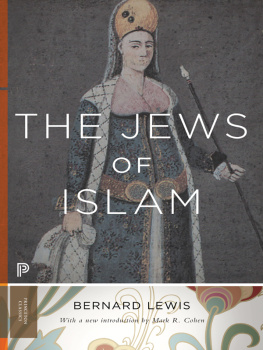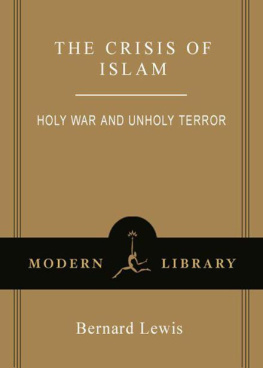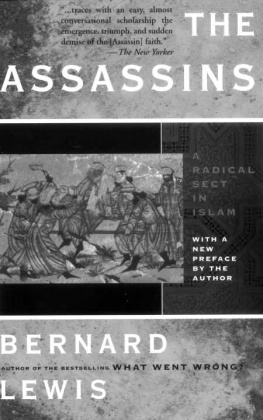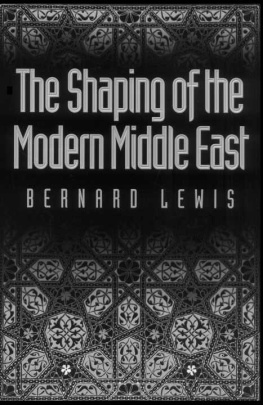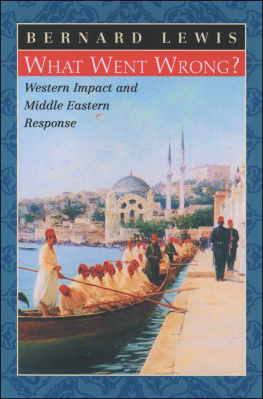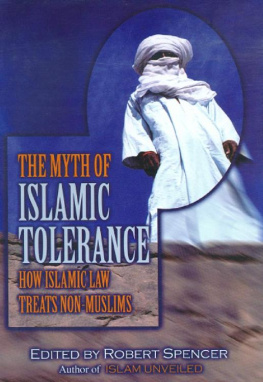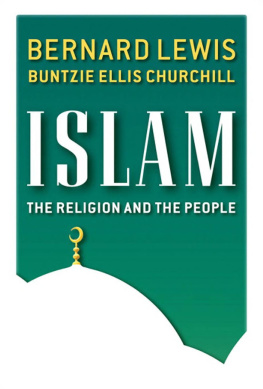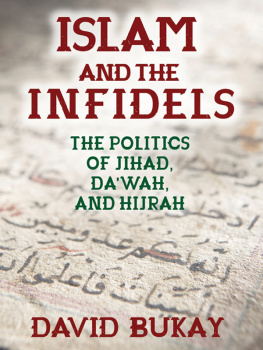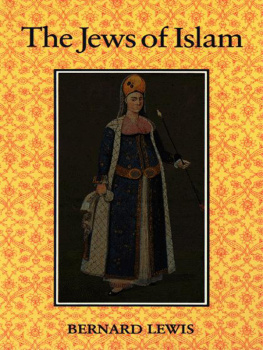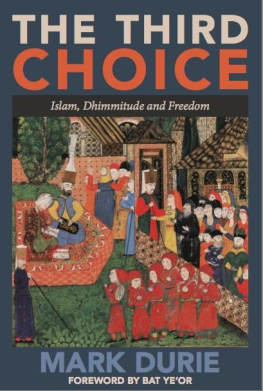
THE JEWS OF ISLAM
The Jews of Islam
BERNARD LEWIS

with a new foreword by Mark R. Cohen
PRINCETON UNIVERSITY PRESS
PRINCETON AND OXFORD
Copyright 1984 by Princeton University Press
Published by Princeton University Press,
41 William Street, Princeton, New Jersey, 08540
In the United Kingdom: Princeton University Press,
6 Oxford Street, Woodstock, Oxfordshire OX20 1TW
All Rights Reserved
First Princeton Paperback printing, 1987
First Princeton Classics Paperback printing, with a new foreword, 2014
ISBN: 978-0-691-16087-0
Library of Congress Control Number: 2014943651
This book has been composed in Linotron Sabon
Princeton University Press books are printed on acid-free paper and meet the guidelines for permanence and durability of the Committee on Production Guidelines for Book Longevity of the Council on Library Resources
press.princeton.edu
Printed in the United States of America
10 9 8 7 6 5 4 3 2 1
F OR Y , WHO WILL UNDERSTAND
No ha de haber un espritu valiente?
Siempre se ha de sentir lo que se dice?
Nunca se ha de decir lo que se siente?
Francisco de Quevedo
Contents
Note on Illustrations
My thanks are due to the following institutions and individuals for permission to reproduce pictures of items in their possession.
Israel Museum, Jerusalem: Nos.
Hebrew Union College, Skirball Museum, Los Angeles: Nos..
Jewish Museum, London: No.
British Library, London: No..
Professor Myriam Ayalon, Jerusalem: Nos..
Jewish Museum of Greece, Athens: Nos..
Gennadius Library, Athens: Nos..
Foreword
A READING of medieval and modern Jewish history would seem to suggest that Jews in the Diaspora can only flourish, perhaps even only survive in any meaningful sense, under the aegis of one or the other of the two successor religions of JudaismChristianity and Islam. Virtually the whole panorama of Jewish history, or rather that part of it which is of any significance between the destruction of the ancient Jewish centers and the creation of the new Jewish state, is enacted either in the lands of Islam or in the lands of Christendom. There were occasional Jewish settlements in areas dominated by other civilizations and religions, such as India and China, butdespite the very large measure of tolerance they enjoyedthey did not flourish. They had no great share in the life and culture either of those countries or of the Jewish people, and appear to have produced nothing of any real importance for the one or the other. In India it was only with the advent of Islam that the small Jewish communities of that country received a modicum of attention and played a small part. In the realms of Hinduism, Buddhism, and the religions of the Far East, the Jews remained few and inactive, attracting neither persecution nor favor nor even attention. In Hindu India and in China, Judaism atrophied. When Arnold Toynbee used the term fossil to describe the Jews and some other minority groups that survived from the ancient world, he was vehemently criticized. Indeed the term fossil, applied to something as vibrant as Jewish life in the Middle East, in Europe, and in the Americas, seems an absurdity. It is less absurd when applied to the isolated and immobilized Jewish communities of southern and eastern Asia.
The main centers of Jewish life and activity since the early Middle Ages have always been in the lands of Islam and Christendom. It seems that these two religions share some quality that is conducive to active Jewish life and that is lacking in societies dominated by Hinduism, Buddhism, and other faiths, to which perhaps in our own day we should add communism. Under Christian or Muslim rule, Jewish life has not always been comfortable. Jews may be slighted or hated; they may be despised or oppressed or slaughtered, but they are never ignored. For both Christianity and Islam, and therefore for both Christians and Muslims, the Jews and Judaism have a certain cosmic stature. They are known; they have a place, and indeed an important place, in both the theological and historical scheme of things. For good or for evil, they are seen as significant. The Christians even adopted the Jewish scriptures. The Muslims, though they did not go that far, were prepared to recognize the Jewish scriptures as a corrupt relic of an authentic revelation. For the Christian and the Muslim alike, the Jewish religion was neither alien nor absurd. It was a faith of the same kind as his own, but in an earlier and outdated version. He might punish the Jew for not catching up with his own, final version of Gods message; he would not brush him aside as a votary of one minor sect or cult among a multiplicity of others. For the believer, persecution is easier to endure than disregard.
There are, it would seem, certain preconditions required to make possible the kind of cultural symbiosisand still more the mutual and interacting cultural influencesthat gave rise to what is now commonly called the Judaeo-Christian tradition in the Western world, and its equivalent in Islam. Until the twentieth century, when the positions of both Jews and Muslims underwent radical change, the term Judaeo-Islamic is at least as meaningful and as valid as Judaeo-Christian to connote a parallel and in many ways comparable cultural tradition.
As far as I am aware, the term Judaeo-Islamic has been used only by Western scholars and was never adopted either by Jews or by Muslims in the Islamic lands, since neither side saw their relationship in this light. At the present time it is a term of purely historical relevance, since the Judaeo-Islamic tradition no longer exists as a living force. The tradition has been destroyed, and its bearers have gone into exile or to Israel, where the two great branches of the Jewish people, the Jews of Islam and the Jews of Christendom, are meeting again for the first time in centuries and are struggling to create a new synthesis based on their common Jewishness. Their encounter repeats in miniature the clash of the two civilizations from which they come, and the aim of unity will not easily be achieved. The attempt will in part determine, in part be determined by, the parallel effortso far of little availto create a new and different symbiotic relationship between Israel and the Islamic world by which it is surrounded.
In the following pages I have tried to examine the origins, the flowering, and the ending of the Judaeo-Islamic tradition, and to set these processes against the background of both Jewish and Islamic history. At most times and in most places, the Jews of Christendom were the only non-Christian minority in an otherwise wholly Christian land. Under the rule of Islam, in contrast, the Jews were normally one of several religious minorities, usually not the most important. The attitude of Islam to Judaism, of Muslims to Jews, is thus one aspect of a larger and more complex issue. The first chapter is therefore devoted to a general consideration of the relations between Islam and other religionsin theology and in law, in theory and in practice. The second chapter deals with the beginning and formation of the Judaeo-Islamic tradition, and is mainly concerned with the formative and classical periods of medieval Islam. The third chapter concentrates on the Ottoman Empire, the last of the great Islamic world states and the home of large and important Jewish communities; it also touches more briefly on other Muslim states in North Africa and in Asia. The fourth and last chapter, covering the nineteenth and twentieth centuries, takes as its theme the era of Western impact on the world of Islam, and the final phase of the Judaeo-Islamic tradition.
Next page
